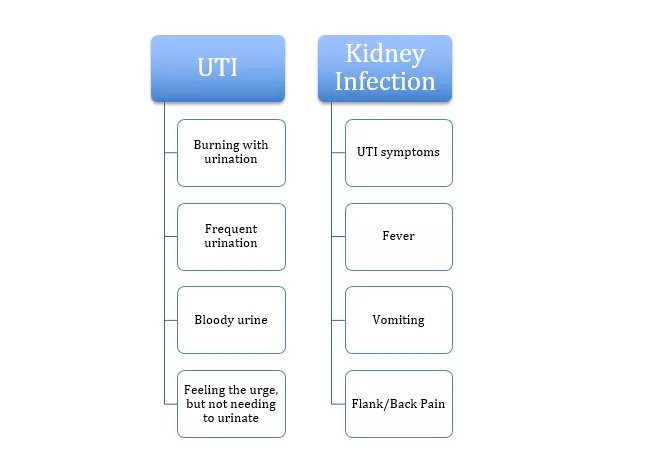Urinary Tract Infection and Kidney Infection — Premier
- Category: Symptoms
- Posted On:
Joshua Strommen MD, FACEP
A urinary tract infection (UTI) is a bacterial infection of the bladder. This infection occurs in males and females but is much more common in women due to a shorter urethra and an environment more suitable for bacterial growth. A UTI may or may not be associated with an infection of the upper urinary tract. If so, this may be referred to as a kidney infection, also known as pyelonephritis.

A UTI occurs when bacteria that normally live in the colon (E. coli), get in the urethra, which then makes its way to the bladder. Conditions that increase the likelihood of obtaining a UTI include recent instrumentation with a catheter, having diabetes, or advanced age. In men, being uncircumcised or having anal intercourse can be risk factors in addition to the above. Being diagnosed with a kidney infection indicates that the bacterium has spread from the bladder to the kidneys directly, or there has been bacterial spread to the kidneys via the bloodstream.
Common symptoms that indicate a UTI are painful urination, urinating frequently, feeling like you need to urinate but can’t, or having blood in your urine. If you have back pain, vomiting, fever, chills, or abdominal pain in addition to UTI symptoms, you likely have a kidney infection.
A urinalysis that shows elevated white blood cells or specific enzymes released from those white blood cells confirms the diagnosis. Additionally, a urine culture will give results on which antibiotic will be effective at killing the bacteria found in the urine. A simple UTI can be treated as an outpatient, with oral antibiotics. With a kidney infection, you may be admitted to the hospital for intravenous antibiotics if you have abnormal vital signs, excessive vomiting, or certain medical comorbidities.
Having an infection of the bladder is easily identifiable and treatable. Most of the time a 5-7 day course of antibiotics is effective treatment. However, some bacteria are resistant to normal medicines or a patient’s immune system may be weakened due to their medical problems, which can cause a potentially serious bacterial infection necessitating hospitalization. At PremiER we have the ability to diagnose and treat both conditions, and if you need hospitalization, we arrange direct admission to your hospital of choice.
